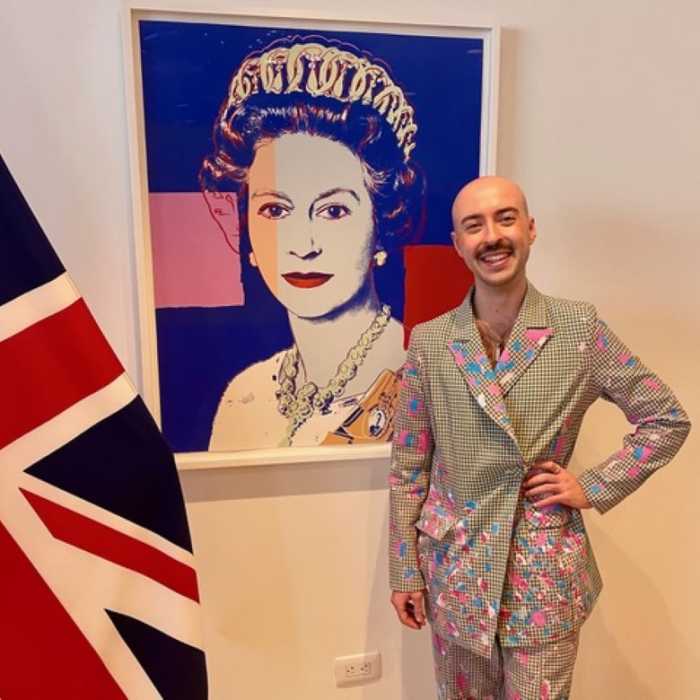Broadway is undergoing a mini-revolution by showcasing Black, queer voices previously shut out of the spotlight. In the 2019 “Choir Boy,” written by Tarell Alvin McCraney and starring Jeremy Pope in a breakout role, a closeted young man fights for acceptance in a prep school for Black students. Last year, Michael R. Jackson’s wildly caustic “A Strange Loop,” about a gay, Black aspiring playwright who confronts racism and homophobia, defied all odds, and won the Tony for best musical.
Enter “Fat Ham,” a scathing tragicomedy about a Black, queer young man called Juicy, grappling with his mother’s decision to marry his dead father’s brother, in a wicked riff on Shakespeare’s “Hamlet.” Written by James Ijames, the action takes place at a modest backyard barbecue celebrating the nuptials of Tedra and Rev (loosely based on Gertrude and Claudius), somewhere in the “American South.”
Alas Juicy, the Hamlet stand-in, is steeped in melancholy and in no mood to celebrate. See, he was visited by the ghost of his ill-tempered father, Pap, who reveals that his death while in prison was not random. In fact, Juicy’s uncle Rev arranged for Pap to be shanked. Should Juicy avenge his father’s death by slaying his uncle? There’s the rub.
The show’s title refers to the protagonist’s stature, likely described as “portly” in Shakespeare’s day (the script uses the term “thicc”). The motley band of guests include longtime family friend Rabby (evoking Polonius), her son Larry (a kind of Laertes) and daughter Opal (think Ophelia), as well as Juicy’s best bud, Tio (Horatio).
Under the direction of Saheem Ali, “Fat Ham” may be the most trenchant, outrageously entertaining comedy you’ll see on Broadway this season. Originating at the Public Theater last year and co-produced by the National Black Theatre, the staging has gotten crisper, the pacing zippier, and the antics zanier. The singular work pulses with a bold theatricality.
Not that this Pulitzer-Prize winning play is bent only on spoofing Shakespeare. At its core, it’s a thoughtful coming-of-age story, examining identity, masculinity, and destiny. It’s also a coming-out story (multiple coming-out stories, actually).
The deeply sensitive Juicy is stuck in a bizarre state of suspended animation. He’s on the cusp of manhood but still very much a mama’s boy. He is “soft” (code for effeminate) and attracted to men, but has had scant opportunity to explore his sexuality. He’s taking online college courses with an eye towards a career in human resources, yet he is “not good with people.” The tomboyish Opal, who has much in common with Juicy, observes, “We on the verge of gaining our powers but there something that’s like holding us back.”
The gathering is alternately joyful and wretched. Fueled by mouthwatering pork ribs (Rev runs a barbecue joint) and Tedra’s homemade potato salad, they play charades and sing karaoke. The rambunctious, scantily clad Tedra performs a way-too-sexy rendition of Crystal Waters’ “100% Pure Love.” In a stunning contrast, the lights are dimmed and a spotlighted Juicy sings a quietly ferocious version of “Creep” by Radiohead.
“I’m a weirdo. What the hell am I doing here. I don’t belong here,” Juicy wails. His family is oblivious to his pain, and Rev, who despises him for being “a soft pocket of nothing,” mocks his song choice as “weird depressing shit.”
Larry, a Marine who shows up in his military uniform, is an almost too-perfect specimen of confident masculinity. Juicy, on the other hand, wears a shirt with “Mama’s Boy” written in sparkly lettering.
The entire cast is superb, elevating the roles from cartoon cutouts to flesh-and-blood characters. Marcel Spears infuses Juicy with a gritty power beneath a delicate exterior, with more than a dash of wry humor. Chris Herbie Holland embodies the goofy genius Tio with an air of charming vulnerability, as he pontificates, often under the influence of weed, about Juicy’s curse of being from of a long line of incarcerated Black men.
“These cycles of violence are like deep, engrained,” says Tio. “You carrying around your whole family’s trauma man.”
Does Juicy carry out his father’s wishes to destroy his uncle Rev? Not exactly. But the unexpected, dazzling climax is a celebration of hard-won self-actualization, pride, and most important of all, hope.
Fat Ham | American Airlines Theater | 227 W. 42nd St. | $79-$262 | Through June 25 | FatHamBroadway.com | 95 mins., no intermission


































